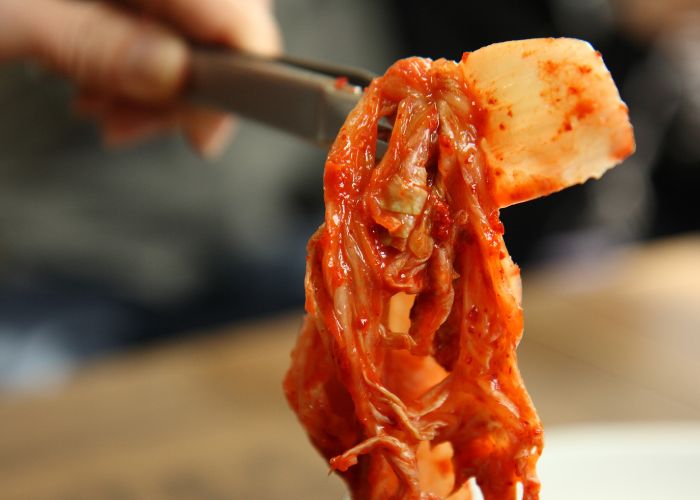When we talk about delicious and unique foods from around the world, kimchi often pops up in the conversation. This Korean staple, known for its spicy, tangy flavours, has captured the taste buds of many. But for those who follow halal dietary guidelines, a common question arises: Is kimchi halal? This question isn’t just about curiosity; it’s about ensuring that the foods we enjoy align with our dietary principles. So, let’s explore this topic together, shedding light on whether kimchi can be a part of a halal diet.
Understanding what are Halal foods
The Quran uses the terms “halal” and “haram” in opposition to one another. Food that complies with Islamic law as stated in the Quran is referred to as halal food. Muslims from throughout the world seek to the Quran and Sunnah for guidance on how to live their lives in accordance with Islamic values. These two teaching sources include timeless principles that modern Muslims can certainly follow. The Quran has clear directives regarding what constitutes halal and haram, much like its unmistakable rules governing every element of human life.
Eating carrion, which includes dead meat, blood, and pig flesh, is prohibited by a verse in the Holy Quran. Furthermore, offering a halal animal as a sacrifice to a god other than Allah is prohibited. As such, Muslims are not allowed to consume insects, alcohol, or any other haram animal.
Also know: Is Parmesan Cheese Halal? A Comprehensive Guide for Consumers
Kimchi and Fermentation

Foods that are fermented have been consumed for generations. In the days before refrigerators, fermentation extended the shelf life of goods. The straightforward process of further converting plant or animal food sources into a form of eatable food is called fermentation. One type of bacteria that aids in fermentation is lactobacillus, which is present in carbohydrates. Foods with fermentation offer a number of health benefits. Because fermentation breaks down food and facilitates a smoother digestive process, they enhance digestion. They enhance the absorption of nutrients, and fermentation enhances the flavour of food that would otherwise be disagreeable.
Examining the lactic acid bacteria involved in the kimchi’s fermentation as well as the characteristics of the fermentation process based on these lactic acid bacteria strains is necessary to comprehend the history of kimchi. The flavour and quality of kimchi are influenced by the many metabolites that lactic acid bacteria produce during fermentation as a result of material type and storage temperature. We can now discuss a crucial query: is food that has undergone fermentation truly Halal? Keeping in mind that fermentation is a natural process, foods that have undergone this process are extremely nourishing and advantageous to the body.
But one of the fermentation byproducts is alcohol, which is forbidden in Islam. However, it should be noted that the amount of ethanol produced during the fermentation process is inadequate to classify the food as non-halal or to render it prohibited in Islam. Yoghourt and pickles are two examples of foods that, despite being fermented, barely slightly create ethanol and are therefore permitted in Islam without creating haram.
Identification of the Ingredients used
Although Napa cabbage is the traditional ingredient for making Kimchi, many other vegetables are now used to create various Kimchi recipes. Typical components of kimchi include: Napa Cabbage, Korean Radish, Carrots, Onion, Garlic, Spring Onion, Ginger, Fish Sauce, Salt, Sugar, and Chili Powder.
Kimchi; From the Halal perspective
For Muslims, kimchi is a suitable dish. Proper kimchi contains a small amount of alcohol. As mentioned above, ethanol could be a result of the fermentation process of kimchi. But the alcohol in kimchi is only present in small amounts, and the most of it evaporates or ferments into vinegar. Islamic scholars say that food that has undergone fermentation is usually halal. Since kimchi is made of fermented veggies, it is halal as well. The amount of alcohol produced during the fermentation process is often quite little. For this reason, this delicious Korean food is vegan-friendly and halal for Muslims.
Can this Halal dish become haram?
If you leave the cabbage to ferment for a long time, it turns sour. This suggests a significant alcohol content, rendering it prohibited. It is best to discard it at this point and make a new one. The Kimchi will also be considered haram if it contains any haram food additives or other haram substances. The Kimchi would also become haram if it contained any haram food additives or other haram ingredients.
FAQs
Can Muslims eat fermented food?
In general, fermented foods are considered halal, as long as the ingredients used in the fermentation process are themselves halal.
Is there any alcohol in kimchi?
Some fermented foods, like yoghourt, kefir, and kimchi, contain only small amounts of alcohol, typically less than 1% by volume.
Is kimchi is vegan?
A staple ingredient is shrimp paste and fish sauce which heightens the flavour and makes it extra tasteful. They also add more garlic to improve the taste of this Korean food. The two seafood ingredients are not part of the vegan diet, which makes Kimchi not vegan.
Does kimchi have pork in it?
Kimchi seems like it should be, pretty obviously, vegetarian.
Conclusion
In wrapping up our exploration of kimchi and its place within halal dietary laws, we’ve uncovered that kimchi can indeed be halal, provided it’s made with ingredients that meet Islamic dietary standards. The key lies in ensuring that all components, from the chilli peppers to the garlic and ginger, are prepared in accordance with halal principles, particularly avoiding any use of alcohol or non-halal animal products during fermentation. For Muslims seeking to enjoy this Korean delicacy, selecting kimchi labelled with halal certification or preparing it at home with halal ingredients offers a delightful way to indulge in its unique, spicy flavors while adhering to dietary beliefs.
Since kimchi has a reasonable amount of alcohol, it meets the permissibility criteria to be considered Halal. Thus, it can be concluded that dishes containing a little amount of alcohol are acceptable in Islam and are therefore referred to as halal.










Leave a reply